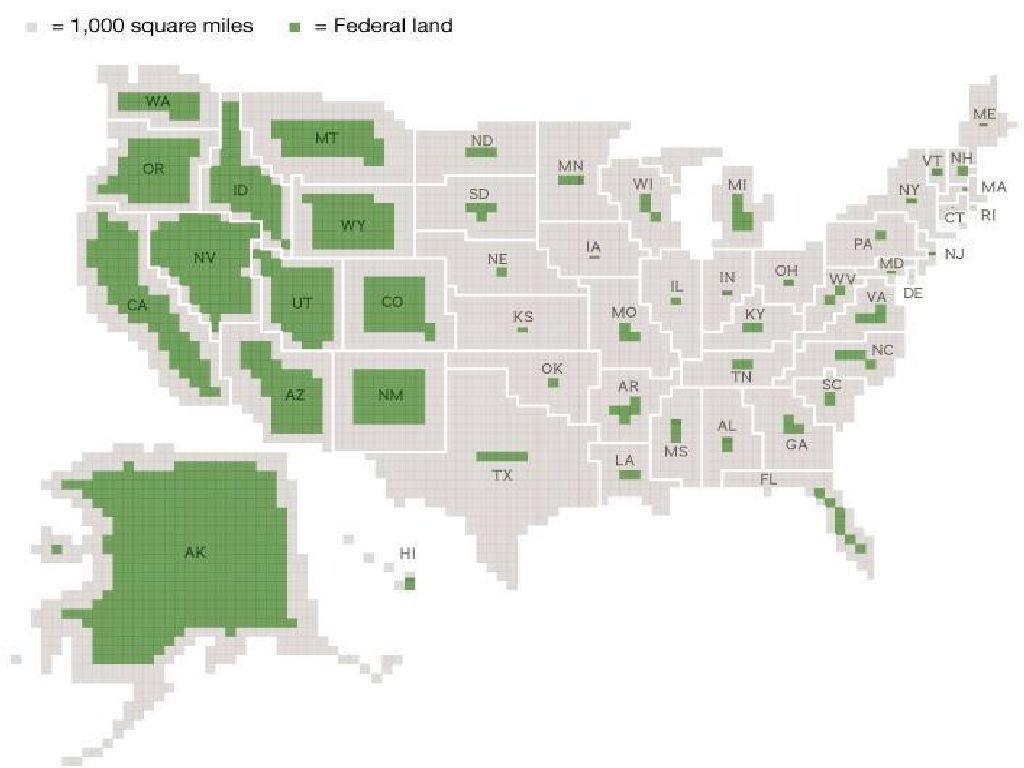| How is a healthy person like the United States? |
 |

The Constitution allows the federal government to possess land in three forms: territories, enclaves and other property. Territories referred to land that was owned by the federal government but had not been formally made into states. Enclaves referred to land within a state that was owned by the federal government for essential purposes such as ‘Forts, Magazines, Arsenals, dock-Yards.’ Other property refers to land holdings for enumerated purposes, and gives the federal government limited discretion to possess land.
The rise of progressivism in America can be clearly seen by taking a look at what land the government owns.
The eastern two thirds of the country have little federally owned land. The dominant belief at the time these states were developed was that private property is a natural right of the individual.
The government needed land only to fulfill its basic duties. There were Federal buildings, post offices and post roads, public parks and libraries, but federally owned land was kept at a minimum. The government mostly stayed out of the way, leaving the majority of land to private ownership.
Western states are different. Land ownership is inverted, and the feds own an overwhelming majority of the land. The dominant belief had shifted by the time these states were developed. By then, the new and dominant theory of progressivism had emerged.
Ronald Reagan – Radio Address to the Nation on Prayer
September 18, 1982
My fellow Americans:
Today is a special day for our citizens of Jewish faith. It’s Rosh Hashanah, the Jewish New Year, marking the beginning of the year 5743 on the Hebrew calendar. So, to all of our friends and neighbors observing this holiday—and speaking for all Americans—I want to wish a happy, peaceful, and prosperous New Year.
Rosh Hashanah also reminds us of the rich and varied religious heritage we Americans are blessed with. More than any other nation, ours draws inspiration from the creeds of many peoples from many parts of the world. They came to our shores from different ports of origin at different times in our history. But all of them—from the men and women who celebrated the first Thanksgiving more than three and a half centuries ago, to the boat people of Southeast Asia—came here with prayers on their lips and faith in their hearts.
It’s because of this shared faith that we’ve become, in the words of the Pledge of Allegiance, “one Nation under God, indivisible, with liberty and justice for all.”
At every crucial turning point in our history Americans have faced and overcome great odds, strengthened by spiritual faith. The Plymouth settlers triumphed over hunger, disease, and a cruel northern wilderness because, in the words of William Bradford, “They knew they were pilgrims. So they committed themselves to the will of God and resolved to proceed.”
George Washington knelt in prayer at Valley Forge and in the darkest days of our struggle for independence said that “the fate of unborn millions will now depend, under God, on the courage and conduct of this army.”
Thomas Jefferson, perhaps the wisest of our Founding Fathers, had no doubt about the source from which our cause was derived. “The God who gave us life,” he declared, “gave us liberty…”
And nearly a century later, in the midst of a tragic and at times seemingly hopeless Civil War, Abraham Lincoln vowed “that this nation, under God, shall have a new birth of freedom.”
It’s said that prayer can move mountains. Well, it’s certainly moved the hearts and minds of Americans in their times of trial and helped them to achieve a society that, for all its imperfections, is still the envy of the world and the last, best hope of mankind.
And just as prayer has helped us as a nation, it helps us as individuals. In nearly all our lives, there are moments when our prayers and the prayers of our friends and loved ones help to see us through and keep on the right path. In fact, prayer is one of the few things in this world that hurts no one and sustains the spirit of millions.
The Founding Fathers felt this so strongly that they enshrined the principle of freedom of religion in the first amendment of the Constitution. The purpose of that amendment was to protect religion from the interference of government and to guarantee, in its own words, “the free exercise of religion.”
Yet today we’re told that to protect that first amendment, we must suppress prayer and expel God from our children’s classrooms. In one case, a court has ruled against the right of children to say grace in their own school cafeteria before they had lunch. A group of children who sought, on their own initiative and with their parents’ approval, to begin the school day with a 1-minute prayer meditation have been forbidden to do so. And some students who wanted to join in prayer or religious study on school property, even outside of regular class hours, have been banned from doing so.
A few people have even objected to prayers being said in the Congress. That’s just plain wrong. The Constitution was never meant to prevent people from praying; its declared purpose was to protect their freedom to pray.
The time has come for this Congress to give a majority of American families what they want for their children—the firm assurance that children can hold voluntary prayers in their schools just as the Congress, itself, begins each of its daily sessions with an opening prayer.
With this in mind, last May I proposed to the Congress a measure that declares once and for all that nothing in the Constitution prohibits prayer in public schools or institutions. It also states that no person shall be required by government to participate in prayer who does not want to. So, everyone’s rights—believers and non believers alike-are protected by our voluntary prayer measure.
I’m sorry to say that so far the Congress has failed to vote on the issue of school prayer. Just this week, however, I asked Senate Majority Leader Howard Baker to bring this measure to a floor vote. I’m happy to say he told me he’ll do everything he can to accomplish this. However, passage requires a vote by the House of Representatives, as well. So, I call on the House leadership to make an equal effort.
Today, on one of the holiest days of one of our great religious faiths, I urge the Members of the Congress to set aside their differences and act on this simple, fair, and long-overdue measure to help make us “one Nation under God” again.
Thank you. God bless you, and God bless America.